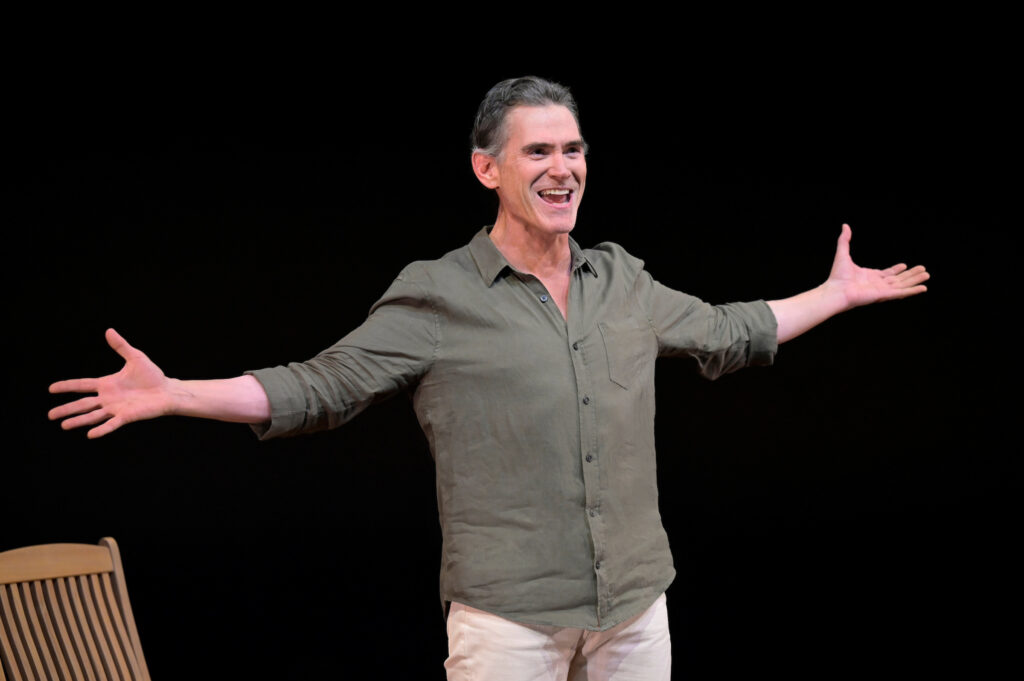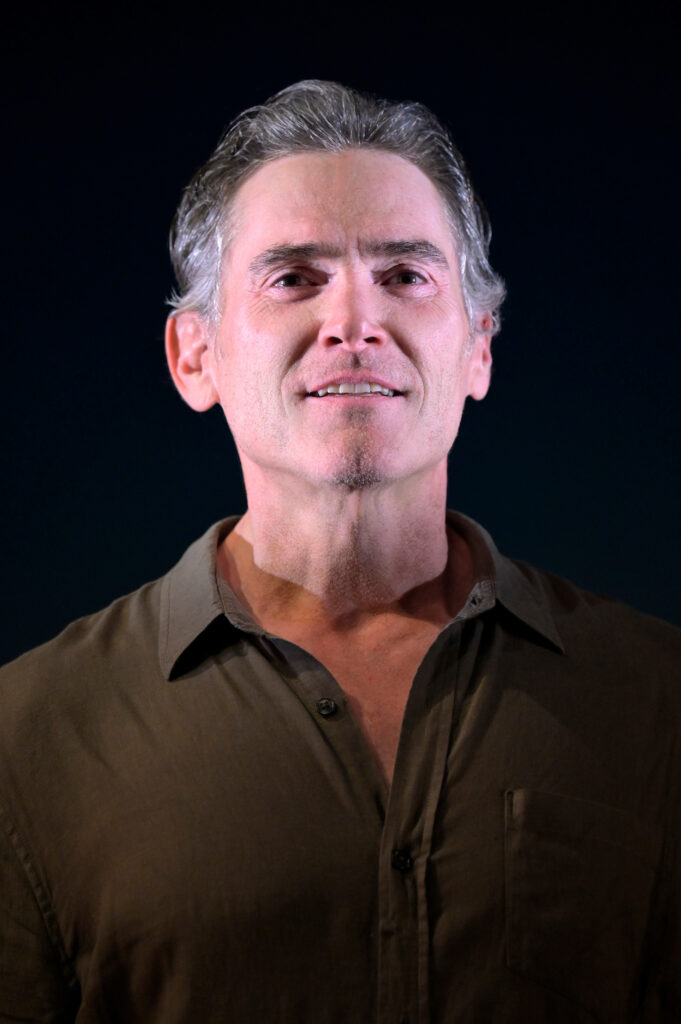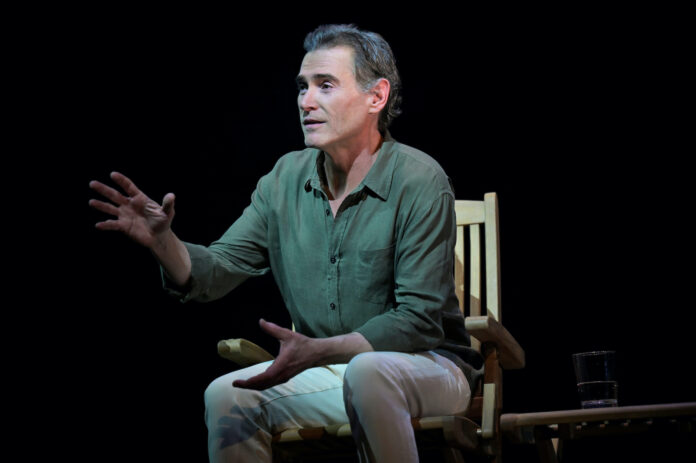I’ve never been a fan of the phrase “fake it ‘til you make it”. It gives one the false hope that some vaporware dream is within reach, and that only a few fact-free maneuvers are needed to get there. Don’t get me wrong: I appreciate a good life-hustle as much as the next not-born-rich person. But I hate that phrase and the way it suggests that the only way to gain success is to live as something other than your true self.
The eponymous lead of David Cale’s Harry Clarke (through December 23 at Berkeley Rep) doesn’t just fake at being who he claims, he operates on a level of bullshit that jumps from “little white lies” to “Stephen Glass” to a level just below WR Hearst’s intent behind his infamous saying “You furnish the pictures and I’ll furnish the war.” But then, Hearst was a greedy capitalist with no qualms about reaping blood money; Glass and Clarke may be subject to undiagnosed mental issues.
We learn early on that our lead (Billy Crudup) is really Philip Bruglestein from the Midwest. His father verbally, physically, and emotionally abused the effeminate lad in his younger days, to which Phil’s mother seemed all but indifferent. As a coping mechanism, Phil adopts a British accent and creates the macho persona of “Harry Clarke” to deal with the world—not so much dissociative identity disorder as a stage persona, off-stage.

As an adult in New York, Phil’s poor social skills lead to him almost hypnotically stalking a man across the city. All Phil has to do is eavesdrop to find out that the WASP-y fellow is Mark Schmidt, who recently broke up with French girlfriend Sabine, with whom he lived in Connecticut. Mark eventually catches a glimpse of Phil, who instinctively puts on the accent and introduces himself as “Harry Clarke,” music producer and supposed acquaintance of Mark’s from back when he and Sabine were together.
Thus begins this faux Brit’s ingratiation into Mark’s silver spoon life, where everyone has secrets and the only thing harder than giving up lies is trying to live with the truth.
I’ve probably mentioned before that I like to go into a show as fresh as I can. As such, I knew practically nothing about this play going in. I knew it starred “golden god” Billy Crudup, that its production in December meant the Rep had to push their proper Christmas show back to January 2024, and that the show has been sold out for weeks. Even the Sunday masked matinee I attended was packed to the gills (including a service dog that sat at the feet of the woman across from me.)
So, how does one of the most anticipated shows of the season hold up? It’s not bad. Crudup is worth watching the entire 90-or-so minutes of runtime thanks to Leigh Silverman’s fine direction. Alexander Dodge’s set—a square wooden dock with a wooden beach chair that seems to exist in the void with a blue horizon-like backdrop—is put to great use against Alan Edwards’ lights and Bart Fassbender’s soundscapes. Cale’s script requires some leaps in logic, but a lot of the appeal of following Phil Bruglestein is the way he tries to wrap his head around everyone taking “Harry Clarke” at face value. All in all, it’s a well-done production.
I’m just at a loss as to why it’s created such a high demand. My press comp for the show—which, due to the Rep’s adjusted Covid policies, were not on opening night—took quite a while to be confirmed because the show was selling out in record time. As much as I liked the show and dug Crudup’s performance, I’ve yet to figure out what’s had everyone foaming at the mouth to witness this production. The buzz makes it out to be a once-in-a-lifetime event that has to be witnessed with one’s own eyes, rather than heard about anecdotally.

Harry Clarke is a solo show about a guy who pretends to be a different guy who omnisexually both screws and screws up a bunch of richies who believe his increasingly tall tales. Again: not bad, but why couldn’t the proper Christmas show go up now (during, y’know, the start of December)?
I will say that I appreciated Cale’s script acknowledging the slippery slope of one’s “Sasha Fierce” personality taking on a life of its own. There’s a running gag in the show about Harry Clarke saying he knows Sade and only having to create a limited amount of subterfuge to be taken at his word. It has shades of Six Degrees of Separation and explores the proverbial “security blanket” one can find in an alias (something the internet knows all too well).
With what little looking around I did, the patrons of this masked matinee seemed to properly adhere to the show’s rules—not counting the aforementioned service dog, who didn’t bark once. The Rep’s HVAC system continues to impress, with my Aranet4’s CO² readings topping off around 713ppm by the end of the show.
If one chooses to see the Rep’s production of Harry Clarke, they’ll see a well-acted show about an unlikely grifter whose marks seem to want his cover to be both true and more grandiose. With so many performances selling out, I applaud the Rep for having a blockbuster on their hands. I don’t understand why it’s so popular, but I’m not about to complain about seeing a show I liked being able to bring in a full house.
HARRY CLARKE runs through December 23. Berkeley Repertory Theatre. Tickets and more info here.







